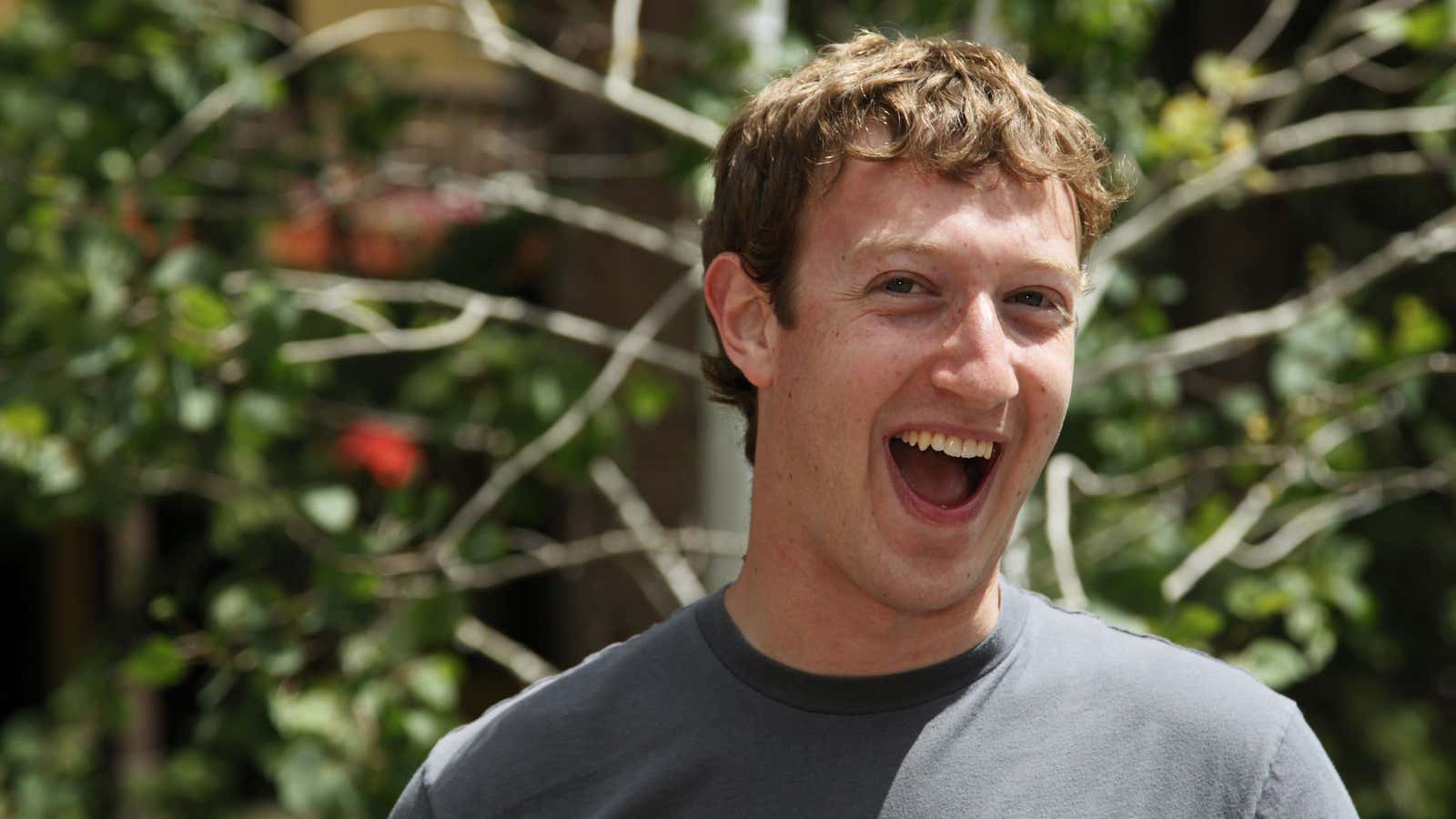This question originally appeared on Quora: What will Facebook look like in ten years? Answer by Chris Schrader former consultant at Facebook.
A few setups to my answer. Facebook has tremendous influence globally. It is likely the most used service in the world, with over one billion people using it daily. It’s also a financial juggernaut which, at the time of this writing, has a market cap of about $275 billion and net income that could very likely exceed $3 billion in 2015.
Depending on where you live, Facebook looks different than other places. This is true today and will in all likeliness continue. As of 2015, the majority people on Earth interact with Facebook using a “feature phone,” and mostly in developing countries. These work great in places where the average person can’t afford a smart phone and Wi-Fi isn’t readily available, but a cellular network is. This applies to a very large percentage of the world’s population. However, there’s about four billion people worldwide that don’t have access to the internet. Facebook is looking to address this with Internet.org.
Internet.org is trying to get the internet to the rest of the world. The approach is to use cellular technologies from aerial platforms.
For those people who will get their connectivity through technology like this, their experience will be pretty much what it looks like today for most of the world. They will use affordable feature phones and their service will be provided by Facebook.
What about those of us in the developed world?
Oculus
Zuckerberg has observed that every 10-15 years there is a breakthrough in technology that ends up changing the way we live our lives. First, it was the common desktop PC with internet access, then the laptop with Wi-Fi, then the modern smart phone. Next? Virtual reality.
Zuckerberg spent a few billion dollars buying Oculus, which is a virtual reality platform primarily aimed at gamers.
How will this change how we interact with Facebook? Engineers just released 3D video on Facebook. Right now, when you view it in a browser or on mobile, its a little bit cheesy and gimmicky, but the technology and research that went into it is what they really care about.
Ten years from now, is it crazy to think that your smartphone can take a 3D video of something? It already has a camera on the front and back. You can already do panoramic photos. Imagine wanting to share an experience with someone on Facebook. Instead of someone seeing a photo you took at the Grand Canyon, what if they could experience it exactly like you did, in a virtual reality platform that was captured by your smartphone?
What about just keeping in touch with people? There’s the Facebook wall and Messenger. Google has something a little different with hangouts. What if instead of a video chat, you’re in a virtual room literally hanging out with your friends? Instead of there just being a screen of a single video of one person, what if it was a virtual living room with people sitting on couches, or mingling around a fire? Heck, lets throw in some content delivery. Want to watch the latest episode of Game of Thrones with your friends? Want to interact with characters from Game of Thrones with your friends? Or how about just watching the news? CNN certainly has the capability of going on-site to a location and do a story, entirely in 3D, allowing their audience to see/experience the same thing the reporter does. Facebook is already hosting presidential debates. And there was even a 3D experience for one of them.
Speaking of Google, you might ask yourself, hey didn’t they try something like that and have it not really take off?
Here’s what Google got wrong. They assumed that we all wanted to be connected to our physical world with a digital experience overlaying it. After all, its pretty cool idea, especially if you’re a programmer at Google. This is where Facebook has an opportunity to get it right. This kind of technology isn’t about enhancing or replacing reality. It’s about having a form of entertainment that you use to get away from reality for a bit before coming back. We all do this today. I have Facebook open in another browser window right now, and occasionally flip over to it to see what’s going on. I use it as a way to distract me when I need a mental break.
Facebook has to stay relevant, a constant challenge for companies that experience the “hockey stick” growth of many Silicon Valley startups. One problem with being a super popular platform is that everyone uses it. Turns out this was a problem with teenagers when their parents all started signed up. It’s not cool to use the same social network as your dad. So what did Facebook do? They bought one of the most popular networks amongst teens, Instagram, and they’ve kept it a separate platform.
In 10 years, the phone apps will still be there, and most people in the world will use Facebook on a feature phone. But there will also be the ability to interact with your friends and their content in a very immersive and realistic way. The technology to create all of this exists now. The biggest limiting factor to creating this vision is bandwidth.
In the interest of full disclosure and openness, I’ve been a consultant in Facebook’s data engineering group in the past. I have a bit of an outsider’s inside view of Facebook. While I know people associated with everything I mentioned, I have no actual knowledge of anything I described above.
You can follow Quora on Twitter, Facebook, and Google+.
More from Quora:
What would Mark Zuckerberg likely be doing today if he had never founded Facebook?
Why would an engineer want to work at Google instead of Facebook?
What have been Facebook’s greatest technical accomplishments?
